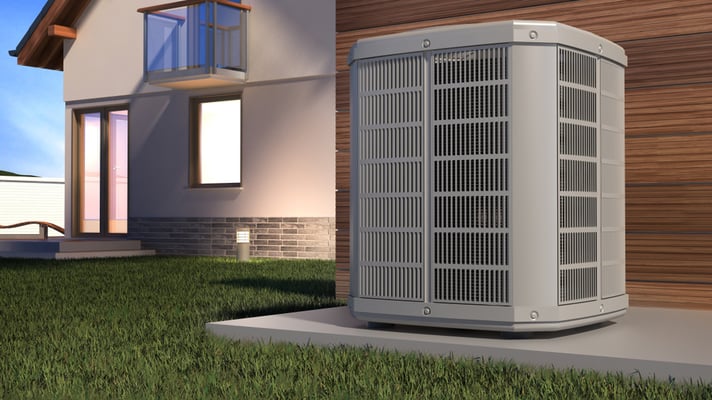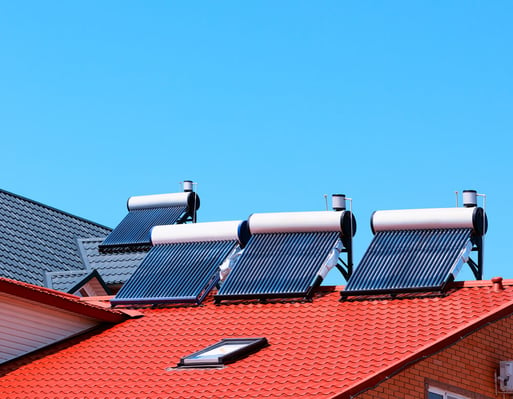Can My Heating System Run with Solar Energy?

Heating systems are fundamental for homes and apartments during winter, and their operating costs can be high in the coldest months. However, there are many ways to use solar energy in space heating and domestic hot water applications, reducing your heating expenses.
- Unless you live in a remote location, electrical engineers will normally recommend a grid-tied solar power system.
- This improves reliability, and your appliances can rely on the power grid when solar panels are not productive.
The effectiveness of solar-powered heating will depend on the equipment used and its configuration. For example, an ENERGY STAR heat pump offers electricity savings of over 60% compared with a resistance heater. While a resistance heater can only deliver one kWh of heat for every kWh of electricity, a heat pump can produce 2-4 kWh of heat per kWh of electricity.
Even if your heating system uses fuel like natural gas, propane, or oil, it will have electrical components like air handlers or hydronic pumps. Solar panels cannot reduce the direct heating cost in these cases, but they can provide power for the electrical components of the heating system.
Combining Solar Panels with Electric Heating Systems

Ideally, solar panels should be combined with a high-efficiency heat pump, since this maximizes the heating achieved per kilowatt-hour. A resistance heater converts electricity into heat less efficiently, which means two things:
- You will need more solar panels to offset your heating costs.
- You must rely more on local utility services since solar energy is used less efficiently.
Assume you live in a city where the residential electricity tariff is 16 cents/kWh. If you consume 1,000 kWh with an electric resistance heater, you are billed $160 and you get 1,000 kWh of heat. However, a heat pump will produce over 2,500 kWh of heat for that same cost and consumption. This same heating output would have cost $400 with a resistance heater.
The same applies to solar panels: an output of 1,000 kWh only saves you $160 if you use an electric resistance heater, but your savings are increased to $400 when combining solar panels with an efficient heat pump.
Save on heating costs during the winter months with solar power.
Using Solar Collectors for Hot Water

Another option is using sunlight directly to heat water with a solar collector, and this system can be combined with solar panels. However, there are important differences between them:
- The electricity produced by solar panels can be used for any home appliance, not only heat pumps or resistance heaters.
- A solar collector only produces hot water. It can be used directly, or it can be circulated through space heating pipes.
In properties with enough space, using both solar panels and hot water collectors is viable. However, when space is limited, solar panels are generally a better investment: their electricity can be used by any device, and they can also cover air conditioning costs during summer.
Heat pumps are also available for hot water systems, and they offer many advantages over resistance-based water heaters. If surplus electricity from solar panels is used to power a heat pump and store hot water, you can use it at night when the panels are no longer productive.
Using Space Heating Systems During a Blackout

Large areas of the US were affected by blackouts during the February 2021 winter storm, leaving millions of people without heating. Using solar panels directly to run a heating system during a blackout is impractical, for several reasons:
- They produce no electricity at night, precisely when the lowest temperatures arrive.
- Consider that winter storms bring cloudy weather, which reduces the productivity of solar panels even during the day.
A solar-powered heating system can be enhanced with energy storage, making it useful even during a blackout. A well-insulated tank can store hot water, while a home battery system can provide electricity for space heating, ideally with a heat pump. When solar panels are productive, their output can be used to replenish any of the two storage devices.
Another advantage of this configuration is not being limited to solar panels, and you can use other electricity sources. For example, if your electric tariff has variable prices during the day, you can charge the batteries and store hot water after midnight, when the lowest rates are charged. While this is not possible during a blackout, a smart home system can be programmed in advance to always keep enough battery charge and hot water. Solar panels are used during the day, and cheap electricity is used after midnight.
Conclusion
Solar panels and efficient heating systems can achieve synergy, reducing your energy costs during winter. Even if you have a combustion heater, solar power can be used by the electrical components of the heating system. If the installation is combined with a home battery and an insulated tank, you can store electricity and hot water for blackouts. This feature is very useful if a winter storm causes extended blackouts in your area.
2021 and 2022 provide an excellent opportunity to install solar panels in the US, since Congress extended the 26% federal tax credit for two years in December 2020. This means you get a tax deduction of $260 for every $1000 invested in solar power.

Michael Tobias
Michael Tobias, the Founding Principal of NY Engineers, currently leads a team of 150+ MEP/FP engineers and has led over 4,000 projects in the US
Join 15,000+ Fellow Architects and Contractors
Get expert engineering tips straight to your inbox. Subscribe to the NY Engineers Blog below.

